Indian Human Spaceflight Program (HSP)
- Thread starter Indx TechStyle
- Start date
More options
Who Replied?The Juggernaut
New Member
- Joined
- Feb 24, 2018
- Messages
- 7,040
- Likes
- 44,238
SKC
New Member
- Joined
- Aug 16, 2014
- Messages
- 9,483
- Likes
- 32,249
Space ko bhi nahi chhora BJP ne. Sanghified the spacesuits now.Oh my secularism, No white and green. BJP using RSS agenda to saffronize ISRO. Mudi must rejain.
Where is democracy, where is the secularism.
This is not the India Gandhi imagined.
TopWatcher
New Member
- Joined
- Feb 19, 2022
- Messages
- 1,762
- Likes
- 4,616
Yes, otherwise not possible in long run. ISRO doing full fledge setup.Is there plan to develop all training facilities within India itself?
The Juggernaut
New Member
- Joined
- Feb 24, 2018
- Messages
- 7,040
- Likes
- 44,238
- Joined
- Apr 29, 2015
- Messages
- 18,416
- Likes
- 56,946
Gaganyaan: First unmanned flight this year, Indians in space by 2025
Dr. Nilesh Desai, Director, Isro Space Applications Centre said there will be three unmanned test flights before the final manned mission, with the first uncrewed mission scheduled later this year.
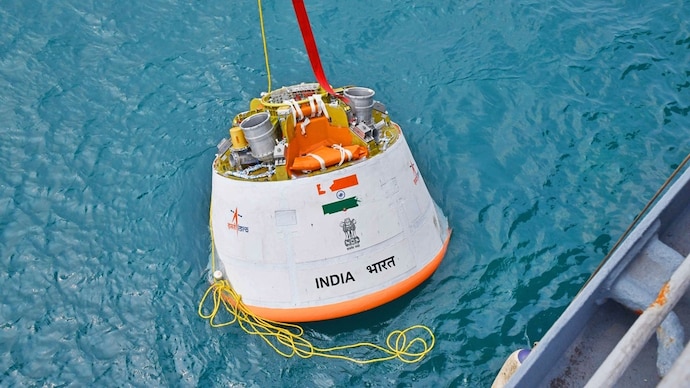
The first unmanned launch of Gaganyaan mission is likely to take place in 2024. (Photo Isro)
In Short

Dr. Nilesh Desai, Director, Isro Space Applications Centre said there will be three unmanned test flights before the final manned mission, with the first uncrewed mission scheduled later this year.

The first unmanned launch of Gaganyaan mission is likely to take place in 2024. (Photo Isro)
In Short
- The selection criteria for astronauts will also be narrowed down
- The crew command and control systems developed by SAC will ensure constant communication
- Gaganyaan is set to travel 200-400 kms above Earth
India's human spaceflight program is progressing rapidly towards the much-anticipated Gaganyaan mission in 2025, which will carry Indian astronauts to space for the first time, revealed Dr. Nilesh Desai of ISRO's Space Applications Centre (SAC) told India Today.
Prime Minister Narendra Modi on Tuesday handed the astronaut wings to four Indian Air Force officers selected to be the first Indian astronauts, part of the Gaganyaan Mission.
These astronauts are Group Captain Prasanth Balakrishnan Nair, Group Captain Ajit Krishnan, Group Captain Angad Pratap and Wing Commander Shubhanshu Shukla.
Outlining the roadmap, Dr. Nilesh Desai said there will be three unmanned test flights before the final manned mission, with the first uncrewed mission scheduled later this year.
The net two unmanned missions will be conducted in 2025.
The selection criteria for astronauts will also be narrowed down, with only 1-2 astronauts likely to travel on the inaugural flight.
Elaborating on mission specifics, Dr. Desai said the crew command and control systems developed by SAC will ensure constant communication with the astronauts throughout the journey.
Gaganyaan is set to travel 200-400 kms above Earth in low earth orbit for 3-7 days. The spacecraft has provision for a 3-4 member crew.
Post the Gaganyaan flights, India has ambitious long-term goals including the development of the space station and mounting bigger missions to the Moon.
"Today we train astronauts to go to space, soon it will be the first step towards space tourism," said an optimistic Dr. Desai.
Isro is gaining pace in space exploration after the success of the Chandrayaan-3 mission and the Aditya L1 mission to study the Sun.
The unmanned and manned missions planned over the next two decades will establish India's position as a space power while opening up future avenues for space exploration and tourism through public-private partnerships.
- Joined
- Apr 29, 2015
- Messages
- 18,416
- Likes
- 56,946
Gaganyaan Mission: A day in the life of Indian astronauts
Prime Minister Narendra Modi on Tuesday handed the astronaut wings to the selected candidates, who will fly to space, as part of the Gaganyaan Mission.

In Short
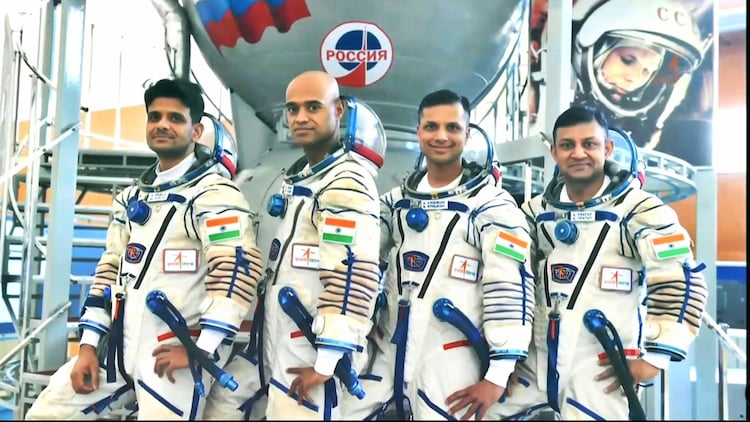
Gaganyaan astronauts during training in Russia. (Photo: Isro)
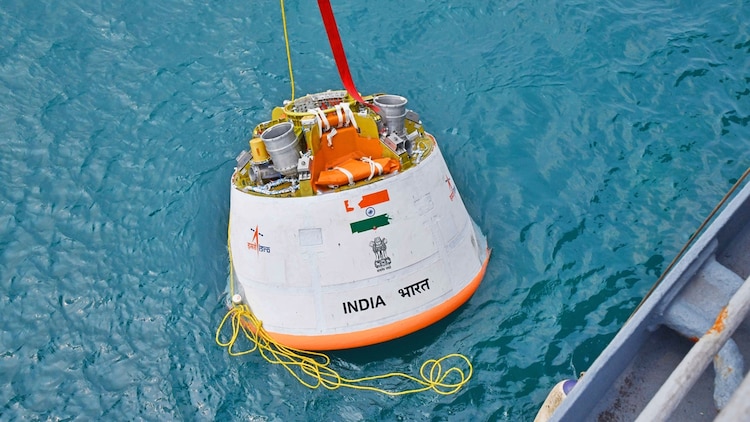
The intensive regimen will provide hands-on experience in operating the crew module's critical systems. (Photo: Isro)
Prime Minister Narendra Modi on Tuesday handed the astronaut wings to the selected candidates, who will fly to space, as part of the Gaganyaan Mission.

In Short
- Prime Minister Narendra Modi on Tuesday handed the astronaut wings
- The astronaut quartet comprise Indian Air Force (IAF) pilots
- The current training curriculum consists of over 200 specialised lectures
India's four astronaut-designates selected for the ambitious Gaganyaan human spaceflight mission set for launch in 2025 are undergoing intense training at the Indian Space Research Organisation's (ISRO) crew training facility in Bengaluru.
Prime Minister Narendra Modi on Tuesday handed the astronaut wings to the selected candidates, who will fly to space, as part of the Gaganyaan Mission.
The astronaut quartet comprising Indian Air Force (IAF) pilots Group Captain Prasanth Balakrishnan Nair, Group Captain Ajit Krishnan, Group Captain Angad Pratap and Wing Commander Shubhanshu Shukla have a packed schedule filled with classroom sessions, simulator training, microgravity familiarization, survival drills and flying practices.
"They are being trained on aero-medical aspects, recovery and survival procedures in addition to academic courses on Gaganyaan flight systems," an ISRO official told news agency PTI. "Training modules also include physical fitness, simulator training and spacesuit familiarization."
The mission-specific preparations commenced after the four astronauts completed their general spaceflight training in Russia at the Gagarin Cosmonaut Training Center.
As per ISRO sources, the current training curriculum consists of over 200 specialised lectures by ISRO scientists and Indian Institute of Science faculty. The crew has also gone through 75 fitness sessions and 12 hours of flying practices besides medical checkups and progress evaluations.

Gaganyaan astronauts during training in Russia. (Photo: Isro)
The facility in Bengaluru houses various simulators like the Independent Training Simulator, Virtual Reality Training Simulator, Dynamic Training Simulator and Static Mock-up Simulator to equip the astronauts-in-training for nominal and emergency scenarios during the mission.
The intensive regimen will provide hands-on experience in operating the crew module's critical systems before the astronauts embark on their historic voyage aboard India's heavy-lift GSLV Mk III rocket by 2025-end.

The intensive regimen will provide hands-on experience in operating the crew module's critical systems. (Photo: Isro)
The ambitious Gaganyaan project
aims to demonstrate indigenous capability to undertake human spaceflights by sending a three-member crew to low earth orbit for three days and safely bringing them back.
India aims to become the fourth country in the world to independently send humans to space.
- Joined
- Apr 29, 2015
- Messages
- 18,416
- Likes
- 56,946
From Ohsin on reddit.
Tender for supply of White Room to UT/SLP for Gaganyaan project
Design, fabrication, supply, erection & commissioning of first white room at SDSC-SHAR [PDF] [Archived]
Tender Specifications [PDF] [Archived]

Render of White Room at SLP/UT

Render of White Room at SLP/UT

Equipment layout of White Room
Imgur mirror:
The scope of work includes following:
Tender for supply of White Room to UT/SLP for Gaganyaan project
Design, fabrication, supply, erection & commissioning of first white room at SDSC-SHAR [PDF] [Archived]
Tender Specifications [PDF] [Archived]
Render of White Room at SLP/UT
Render of White Room at SLP/UT
Equipment layout of White Room
Imgur mirror:
Scope of work:Umbilical tower (UT) of Second Launch Pad (SLP) is located at SDSC SHAR, Sriharikota which supports the launching of ISRO’s Launch vehicles like PSLV, GSLV MK-II and LVM3. The second launch pad (SLP) is identified for ISRO’s Gaganyaan mission. To cater this requirement at SLP, the umbilical tower (UT) at launch pad will be augmented with various new systems and one such system to be newly realized is white room. The white room is basically a light weight clean room to be realized for environment control to carry out last minute preparation activities for crew members. This white room will be realized on cantilever platform called as Platform-A. As the white room is planned at tip of the cantilevered Platform-A which is positioned at 44.2m elevation, it is always paramount to optimize the self-weight of the room within the allowable capacity of platform and to limit the self-weight deflection of the platform. Being the white room is in open environment, it will experience severe wind conditions up to 30m/s, acoustic, temperature, over pressure and vibration load during launch vehicle lift-off.
The scope of work includes following:
- Design of white room as per the Preliminary drawing and the design loads provided by Department.
- Preparation of General Arrangement Drawing, fabrication Drawing, Quality Assurance plan etc.
- Manufacturing & selection of sample panel & Qualification/testing of same as per the standard.
- Mass manufacturing of panels and fabrication of aluminum frame for room.
- Assembly of panels to frame.
- Final erection of room at UT/SLP.
- Joined
- Apr 29, 2015
- Messages
- 18,416
- Likes
- 56,946
Picked Gaganyaan patch from reddit.

- Joined
- Apr 29, 2015
- Messages
- 18,416
- Likes
- 56,946
Google translate AsiaNet
'First unmanned Gaganyaan mission soon, Indian space station design in final stages': ISRO chairman
'The four people selected for the Gaganyaan mission team are well trained. The design of the space station announced by the Prime Minister yesterday is in its final stages.
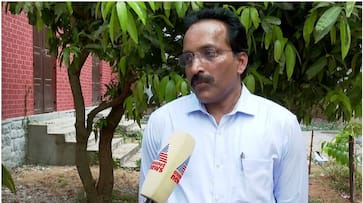
Malayalee brilliance in the Gaganyaan mission
'First unmanned Gaganyaan mission soon, Indian space station design in final stages': ISRO chairman
'The four people selected for the Gaganyaan mission team are well trained. The design of the space station announced by the Prime Minister yesterday is in its final stages.

Thiruvananthapuram: ISRO Chairman S. Somnath said that the Gaganyaan mission will be carried out in 2025. Three unmanned missions will be conducted before launch. The first unmanned mission will be by July this year. ISRO Chairman responded to Asianet News that two more unmanned missions will be conducted next year.
'The four people selected for the Gaganyaan mission team are well trained. The design of the space station announced by the Prime Minister yesterday is in its final stages. The space project in collaboration with NASA is also in the final stage. Indian astronaut selected for NASA mission' It is hoped that this task will be done soon. Somnath told Asianet News.
The first manned Gaganyaan mission will carry a maximum of two passengers. Sending only one traveler on the maiden mission is also under consideration. One of the four selected will visit the International Space Station before the Gaganyaan journey.
Malayalee brilliance in the Gaganyaan mission
ISRO selected the Gaganyaan mission team members from among the best pilots of the Indian Air Force. All four are adept at handling Sukhoi and MiG fighter jets and the senior Malayali Group Captain Prashant Balakrishnan Nair has been part of the Air Force for 25 years.
Prashanth joined the National Defense Academy as an engineering student at NSS College, Akathethara, and graduated from the academy in 1998 with the Sword of Honor for the best cadet. He started his military service as a fighter pilot. Starting with drones, it grew to MiG 21, MiG 29 and Sukhoi 30 fighters. Sukhoi led a squad of 30 aircraft. Prashant Gaganyan also brings a wealth of experience of more than 3000 flying hours to the team.
Jimih
New Member
- Joined
- May 20, 2021
- Messages
- 22,994
- Likes
- 134,628
Is ISRO chief suffering from some major ailment?Google translate AsiaNet
'First unmanned Gaganyaan mission soon, Indian space station design in final stages': ISRO chairman
'The four people selected for the Gaganyaan mission team are well trained. The design of the space station announced by the Prime Minister yesterday is in its final stages.
Wishing him a speedy recovery.
- Joined
- Apr 29, 2015
- Messages
- 18,416
- Likes
- 56,946
Cancer he got.Is ISRO chief suffering from some major ailment?
- Joined
- Oct 14, 2020
- Messages
- 28,260
- Likes
- 195,943
He recently recovered from CancerIs ISRO chief suffering from some major ailment?
Wishing him a speedy recovery.
- Joined
- Apr 29, 2015
- Messages
- 18,416
- Likes
- 56,946
After Fab 4, Next Round Of Astronaut Selection May Begin In 6 Month
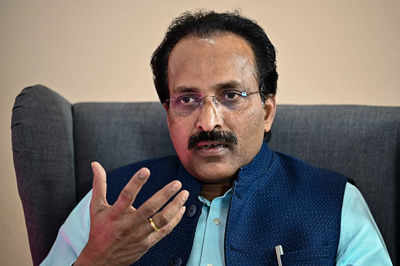
The current astronaut training centre in Bengaluru — where India’s Fabulous-4, Group Captains Prashanth Nair, Ajit Krishnan and Angad Prathap, and Wing Commander Shubhanshu Shukla, are training — is designed to cater only to demands of the first mission under Gaganyaan and Isro will build a larger training facility. Sources now indicate that the larger facility — most likely in Devanahalli although Challakere is not ruled out yet — could accommodate 25-30 astronauts and maybe even their families.

The current astronaut training centre in Bengaluru — where India’s Fabulous-4, Group Captains Prashanth Nair, Ajit Krishnan and Angad Prathap, and Wing Commander Shubhanshu Shukla, are training — is designed to cater only to demands of the first mission under Gaganyaan and Isro will build a larger training facility. Sources now indicate that the larger facility — most likely in Devanahalli although Challakere is not ruled out yet — could accommodate 25-30 astronauts and maybe even their families.
BENGALURU: In a firm indication that India’s endeavours of sending astronauts to space will not be a one-off show of strength but a programme for sustained human presence in space, the process to select the second batch of astronauts for follow-up missions could begin in six months.
The current astronaut training centre in Bengaluru — where India’s Fabulous-4, Group Captains Prashanth Nair, Ajit Krishnan and Angad Prathap, and Wing Commander Shubhanshu Shukla, are training — is designed to cater only to demands of the first mission under Gaganyaan and Isro will build a larger training facility.
As reported by TOI earlier, Isro is considering multiple locations for the larger facility, including Challakere in Chitradurga, some 200km from Bengaluru and Devanahalli on the outskirts of the city, where Isro already has a guest house.
Sources now indicate that the larger facility — most likely in Devanahalli although Challakere is not ruled out yet — could accommodate 25-30 astronauts and maybe even their families.
ECLSS facilityIsro chairman S Somanath told TOI in an exclusive interview: “We’ve not made such a plan yet as it is yet to evolve…It is clear that the Gaganyaan programme has to continue. So, we need to induct additional crew members and that process, maybe, should start in six months. We’ll work with IAF to identify a new set of crew members… It may not be in tens, maybe only four.”
The new members will get trained for follow-on Gaganyaan missions, he said. “...Periodicity of Gaganyaan missions won’t be very frequent to start with becasue for sustained missions we will also need the space station to be ready. We’re only building that (first unit) by 2028, which won’t be human-capable. It will take more time for that. So, where the final astronaut facility will be decided later,” Somanath added.
He said, at Devanahalli, Isro is building the Environment Control and Life Support System (ECLSS) facility and technical facilities for the Human Space Flight Centre (HSFC), which is currently using UR Rao Satellite Centre’s space.
First mission could fly just 1ECLSS is a critical technology for astronauts’ health during the flight, during their time in space and during the return, and Isro, which initially had plans of procuring this technology is now developing everything from scratch.
While the initial plan for the first Gaganyaan mission was to send “two-three” astronauts to space, the selection of only four was indicative that only two may be sent going by global practice of shortlisting.
“I cannot tell how many will eventually go. The three uncrewed missions and abort missions must be completed, even after which there could be residual issues. So it depends on how confident we are at the end of that. A national committee will decide on this later,” Somanath said.
ISS mission“...We’re building it for two people, not three…While we’re building it for two, we could even decide to send only one, but we need not take that decision now,” he added.
All four Gaganyaan astronauts-elect will go to the US by end of 2024 to train and become part of the crew that will go to the International Space Station (ISS), which was announced during PM Narendra Modi’s recent visit to Washington.
“While all four will go to train, only one will go to the ISS. The primary astronaut will go through full-fledged training, the back-up one will train a little less. The other two will also go for ground-level training,” Somanath said.
- Joined
- Apr 29, 2015
- Messages
- 18,416
- Likes
- 56,946
SAKHI to be a friend in need for Gaganyaan crew

The Space-borne Assistant and Knowledge Hub for Crew Interaction (SAKHI) developed by VSSC for the Gaganyaan crew. | Photo Credit: Special arrangement

The Space-borne Assistant and Knowledge Hub for Crew Interaction (SAKHI) developed by VSSC for the Gaganyaan crew. | Photo Credit: Special arrangement
The Vikram Sarabhai Space Centre (VSSC), the Indian Space Research Organisation (ISRO) facility at Thumba in Thiruvananthapuram, has developed a multi-purpose app that will help astronauts on the Gaganyaan space flight mission carry out a range of tasks such as looking up vital technical information or communicating with one another.
That’s not all. The Space-borne Assistant and Knowledge Hub for Crew Interaction (SAKHI) will, among other things, monitor the health of the astronauts, help them stay connected with Earth and even alert them about their dietary schedules.
The space facility has successfully tested an engineering model of the custom-built, hand-held smart device featuring SAKHI. The development of a flight model is in progress.
An indispensable assistant to the crew is how the VSSC describes the application. “During the mission, for instance, the astronauts may need to look up technical documents and training manuals at short notice. Given the limited space in the crew module, taking along thick tomes will be out of the question. SAKHI will ensure that they have all the required data at their fingertips,” VSSC director S. Unnikrishnan Nair told The Hindu.
Kept strapped to their space suits, the digital platform can be quickly accessed at all times. Further, the astronauts can use the app to maintain a log on the mission in multiple formats including voice records, texts and images.
SAKHI will also keep a close watch on their health. “This comprehensive system provides information on key parameters like blood pressure, heart rate and oxygen saturation, providing invaluable insights into the crew’s physical condition throughout their mission,” according to the VSSC.
SAKHI will keep the crew connected with the onboard computer and ground-based stations, guaranteeing a seamless communication link. The app will also remind them about their hydration and dietary schedules and sleep patterns.
ISRO is hoping to launch the Gaganyaan human spaceflight mission in 2025. The identities of the four astronaut-designates, all IAF test pilots, were revealed at a high-profile event attended by Prime Minister Narendra Modi at the VSSC on February 27. The final crew for the mission will be picked from among the four.
- Joined
- Apr 29, 2015
- Messages
- 18,416
- Likes
- 56,946
Isro identifies 48 backup points for safe return of Gaganyaan astronauts
In an ideal situation, the Gaganyaan module is marked to land in Arabian Sea where Indian agencies will be station to rescue the crew and the module, the officials said. However, in case of a deviation in the main plan, the space agency has identified 48 back up sites in international waters, they said.
- Joined
- Apr 29, 2015
- Messages
- 18,416
- Likes
- 56,946
From Dos Monthly Progress Report for 2024
Vacuum ignition test of CE20 E13 cryogenic engine HT-08 successfully conducted for a duration of 2.5 seconds in High altitude test condition at TCT, IPRC on February 13, 2024. With this test, human rating of CE20 engine powering the Human rated-LVM3 vehicle for the Gaganyaan programme has been successfully completed.
Strain gauge bonding activities completed on G1 Crew Module hardware. PUF filling and Vapour Barrier Coating activities also completed in apex region of the Crew Module.
Propellant tanks integration activities completed for Service Module Propulsion System (SMPS) of G1 Service Module.
High altitude Escape Motor Static Test 09 (HEM ST-09) successfully completed at SDSC, SHAR.
Crew Seat and Crew display console integrated to Crew Training Simulator hardware.
Main parachute trial suiting completed for IADT-01. Crew Module. Interfaces for Buoyancy Augmentation System (BAS) also completed.
- Joined
- Oct 14, 2020
- Messages
- 28,260
- Likes
- 195,943
ISRO’s moon missions to stay on course till this one big objective is achieved
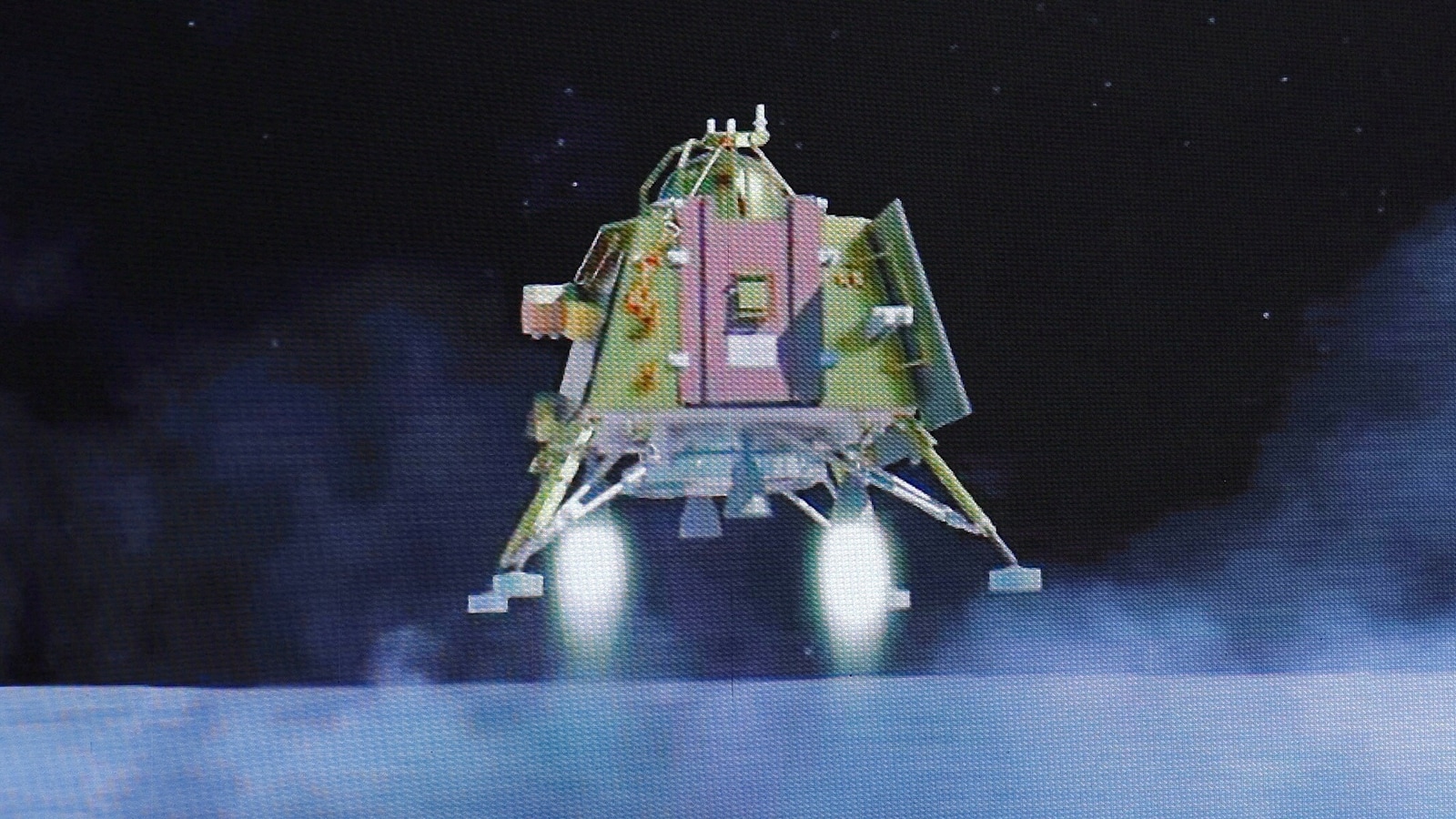
 www.hindustantimes.com
www.hindustantimes.com
Airdrop test mission on 24th April“The airdrop test will happen on April 24. Then two more uncrewed missions will happen next year and then the manned mission, if everything goes well, by the end of next year,” he added.
ISRO’s moon missions to stay on course till this one big objective is achieved
ISRO will keep its moon missions going to ensure it achieves one big objective.
skywatcher
New Member
- Joined
- Apr 25, 2020
- Messages
- 4,446
- Likes
- 1,344
That's weird. Previous sources claimed multiple times the two uncrewed test flight would take place in July and Dec 2024 respectively.ISRO’s moon missions to stay on course till this one big objective is achieved
Airdrop test mission on 24th April

ISRO’s moon missions to stay on course till this one big objective is achieved
ISRO will keep its moon missions going to ensure it achieves one big objective.www.hindustantimes.com
Articles
-
India Strikes Back: Operation Snow Leopard - Part 1
- mist_consecutive
- Replies: 9
-
Aftermath Galwan : Who holds the fort ?
- mist_consecutive
- Replies: 33
-
The Terrible Cost of Presidential Racism(Nixon & Kissinger towards India).
- ezsasa
- Replies: 40
-
Modern BVR Air Combat - Part 2
- mist_consecutive
- Replies: 22
-
Civil & Military Bureaucracy and related discussions
- daya
- Replies: 32
